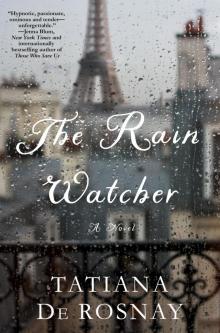- Home
- Tatiana de Rosnay
The House I Loved
The House I Loved Read online
Rue d’Erfurth and Fountain, circa 1865. This photograph was taken before Baron Haussmann’s massive modernization of Paris, when many narrow streets were destroyed to make way for the city’s current broad boulevards. Rose Bazelet’s beloved house can be seen in the center (white); though it was torn down in the renovations, Rose’s secrets linger on here today.
This is for my mother, Stella, and for my House Man: NJ
Acknowledgments
My first thanks go to historian Didier Le Fur, who initiated me into the world of the Bibliothèque Nationale, and to Véronique Vallauri, whose flower shop is the inspiration for Alexandrine’s.
Author’s Note
Born and bred a Parisian, I love my city like most Parisians do. I have always been fascinated by its richness and history. Napoleon III and Baron Haussmann, between 1852 and 1870, gave Paris a new and much-needed modernity. They shaped the city into what it is today.
But I often wondered what it must have been like, as a Parisian, to witness those changes. And what it must have meant to lose a beloved house, like Rose does. Those eighteen years of “embellishments,” before the Commune insurrection stormed the city, were no doubt hell for Parisians. Zola artfully described it, and criticized it, in The Kill. Victor Hugo and Baudelaire also voiced their discontent, as did the Goncourt brothers. But however much Haussmann was resented, his work remains essential to the creation of a truly modern Paris.
I have taken very few liberties with dates and places in this novel. The rue Childebert, the rue Erfurth, the rue Taranne and the rue Sainte-Marguerite did exist, 140 years ago, within Saint-Germain-des-Prés. So did the place Gozlin, the rue Beurrière, the passage Saint-Benoît and the rue Sainte-Marthe.
The next time you walk along the boulevard Saint-Germain, go to the corner of rue du Dragon, just in front of the Café de Flore. You will notice an entire line of ancient buildings, miraculously standing between Haussmannian ones. Those are the vestiges of one side of the old rue Taranne, where the fictitious Baronne de Vresse used to live. A famous American designer has a flagship store there that could very well have been the Baronne’s home. Have a look inside.
When you walk up the rue des Ciseaux, toward the church, try to ignore the noisy boulevard in front of you, and imagine the small and narrow rue Erfurth leading you straight to the rue Childebert, which used to be exactly where the metro station of Saint-Germain-des-Près now stands, on the left. And if ever you glimpse a coquettish silver-haired sexagenarian with a tall brunette on her arm, then you may just have seen Rose and Alexandrine on their way home.
TR
Paris, April 2011
Paris slashed with saber cuts, its veins opened.
—ÉMILE ZOLA, The Kill, 1871
The old Paris is no more (the shape of a city changes faster, alas! than the human heart).
—CHARLES BAUDELAIRE, “The Swan,” 1861
I wish for all this to be marked on my body when I am dead. I believe in such cartography—to be marked by nature, not just to label ourselves on a map like the names of rich men and women on buildings.
—MICHAEL ONDAATJE, The English Patient
Contents
Photograph of rue d’Erfurth and Fountain
Title Page
Dedication
Acknowledgments
Author’s Note
Epigraphs
Begin Reading
Also by Tatiana de Rosnay
About the Author
Copyright
MY BELOVED,
I can hear them coming up our street. It is a strange, ominous rumble. Thuds and blows. The floor aquiver under my feet. There are shouts too. Men’s voices, loud and excited. The whinny of horses, the stamp of hooves. It sounds like a battle, like in that hot and dreadful July when our daughter was born, or that bloody time when the barricades went up all over the city. It smells like a battle. Stifling clouds of dust. Acrid smoke. Dirt and rubble. I know the Hôtel Belfort has been destroyed, Gilbert told me. I cannot bear to think about it. I will not. I am relieved Madame Paccard is not here to see it.
I am sitting in the kitchen as I write this to you. It is empty, the furniture was packed up last week and sent to Tours, with Violette. They left the table behind, it was too bulky, as well as the heavy enamel cooker. They were in a hurry and I loathed watching that being done. I hated every minute of it. The house stripped of all its belongings in one short moment. Your house. The one you thought would be safe. Oh, my love. Do not be afraid. I will never leave.
The sun peeks into the kitchen in the mornings, I’ve always appreciated that about this room. So dismal now, without Mariette bustling about, her face reddened by the heat of the stove, and Germaine grumbling, smoothing back wisps of hair into her tight chignon. If I try, I can almost pick up the enticing wafts of Mariette’s ragout weaving its slow path through the house. Our once-cheerful kitchen is sad and bare without the gleaming pots and pans, kept scrupulously clean by Germaine, without the herbs and spices in their little glass bottles, the fresh vegetables from the market, the warm bread on its cutting board.
I remember the morning the letter came, last year. It was a Friday. I was in the sitting room, reading Le Petit Journal by the window, and drinking my tea. I enjoy that quiet hour before the day begins. It wasn’t our usual postman. This one, I had never seen. A tall, bony fellow, his hair flaxen under the flat green cap. His blue cotton blouse with its red collar appeared far too large for him. From where I was sitting, I saw him jauntily touch his cap and hand the mail over to Germaine. Then he was gone, and I could hear his soft whistle as he marched up the street.
It was early still, I’d had my breakfast a while ago. I went back to my newspaper after a sip of tea. It seemed the Exposition Universelle was all they could talk about these past months. Seven thousand foreigners pouring through the boulevards every day. A whirl of prestigious guests: Alexander II from Russia, Bismarck, the Vice King of Egypt. Such a triumph for our Emperor.
I heard Germaine’s step on the stairs. The rustle of her dress. I do not get much mail. Usually a letter from my daughter, from time to time, when she feels dutiful. Or maybe from my son-in-law, for the same reason. Sometimes a card from my brother Émile. Or from the Baronne de Vresse, in Biarritz, by the sea, where she spends her summer. And the occasional bills and taxes.
That morning I noticed a long white envelope. Closed with a thick crimson seal. I turned it around. Préfecture de Paris. Hôtel de Ville.
And my name, printed large, in black lettering. I opened it. The words leaped out. At first I could not understand them. Yet my reading glasses were perched on the end of my nose. My hands were shaking so hard I had to place the sheet of paper on my lap and inhale a deep breath. After a while I took the letter into my hand again and forced myself to read it.
“What is it, Madame Rose?” whimpered Germaine. She must have seen my face.
I slipped the letter back into its envelope. I stood up and smoothed my dress down with the palms of my hands. A pretty frock, dark blue, with just enough ruffle for an old lady like me. You would have approved. I remember that dress, and the shoes I was wearing that day, mere slippers, sweet and feminine, and I remember Germaine’s cry when I told her what the letter said.
It was not until later, much later, alone in our room, that I collapsed on the bed. Although I knew this would happen one day, sooner or later, it still came as a shock. That night, when the household was asleep, I fetched a candle and I found that map of the city you used to like to look at. I rolled it out flat on the dining room table, taking care not to spill any wax. Yes, I could see it, the inexorable northern advance of the rue de Rennes sprouting straight from the Montparnasse railway station to us, and the boulevard Saint-Germain, a hun
gry monster, creeping westward from the river. With two trembling fingers I traced their paths until my flesh met. Right over our street. Yes, my love, our street.
It is freezing in the kitchen, I need to go down to get another shawl. Gloves as well, but only for my left hand, as my right hand must go on writing this for you. You thought the church and its proximity would save us, my love. You and Père Levasque.
“They will never touch the church, nor the houses around it,” you scoffed fifteen years ago, when the Prefect was appointed. And even after we heard what was going to happen to my brother Émile’s house, when the boulevard de Sébastopol was created, you still were not afraid: “We are close to the church, it will protect us.”
I often go to sit in the church to think of you. You have been gone for ten years now. A century to me. The church is quiet, peaceful. I gaze at the ancient pillars, the cracked paintings. I pray. Père Levasque comes to see me and we talk in the hushed gloom.
“It will take more than a Prefect or an Emperor to harm our neighborhood, Madame Rose! The church is safe, and so are we, its fortunate neighbors,” he whispers emphatically. “Childebert, the Merovingian King, the founder of our church, watches over his creation like a mother would a child.”
Père Levasque is fond of reminding me of how many times the church has been looted, plundered and burnt down to the ground by the Normans in the ninth century. I believe it is thrice. How wrong you were, my love.
The church will be safe. But not our house. The house you loved.
THE DAY THE LETTER came, a feverish panic hit our little street. Monsieur Zamaretti, the bookseller, and Alexandrine, the flower girl, came up to see me. They had received the same letter from the Préfecture. But I could tell they knew it was not so bad for them. They could start their business elsewhere, could they not? There would always be a place in the city for a bookstore and a flower shop. Yes, their eyes dared not meet mine. They felt it was worse for me. As your widow, I owned the place. I let out the two shops, one to Alexandrine, the other to Monsieur Zamaretti, as you used to. As your father did before you, and his father did as well. The income from the shops was how I survived. That was how I made ends meet. Until now.
It was a warm, humid day, I recall. The street was soon humming with all our neighbors brandishing the letter. It was quite a sight. Everyone seemed to be outside that morning, and voices rose vociferously, all the way down to the rue Sainte-Marguerite. There was Monsieur Jubert, from the printing house, with his ink-stained apron, and Madame Godfin, standing outside her herbalist’s shop, and there was Monsieur Bougrelle, the bookbinder, puffing away on his pipe. The racy Mademoiselle Vazembert from the haberdashery (whom you never met, thank the Lord) flounced up and down along the cobblestones, as if to flaunt her new crinoline. Our charming neighbor Madame Barou smiled sweetly when she saw me, but I could tell how distressed she was. The chocolate maker, Monsieur Monthier, appeared to be in tears. Monsieur Helder, owner of the restaurant you used to love, Chez Paulette, was nervously biting his lips, his bushy mustache moving up and down.
I had my hat on, as I never leave the house without it, but in their haste, many had forgotten theirs. Madame Paccard’s bun threatened to collapse as her head waggled furiously. Docteur Nonant, hatless too, was waving an irate forefinger. At one point the wine merchant, Monsieur Horace, managed to make himself heard over the din. He has not changed much since you left us. His curly dark hair is perhaps a trifle grayer, and his paunch has no doubt swollen a mite, but his flamboyant mannerisms and loud chuckle have not faded. His eyes twinkle, black as charcoal.
“What are you ladies and gentlemen doing out here gabbling your heads off? Much good it will do us all. I’m offering the lot of you a round of drinks, even those who never come in to my den!” By that, of course, he meant Alexandrine, my flower girl, who shies away from liquor. I believe she once told me her father died a drunk.
Monsieur Horace’s wine shop is damp and low-ceilinged, and has not been altered since your day. Rows and rows of bottles line the walls, hefty tubs of wine tower over wooden benches. We all gathered around the counter. Mademoiselle Vazembert took up a vast amount of space with her crinoline. I sometimes wonder how ladies live a normal life ensconced within those cumbersome contraptions. How on earth do they get into a hackney, how do they sit down for supper, how do they deal with private, natural matters? The Empress manages easily enough, I presume, as she is pampered by ladies-in-waiting who answer every whim and attend every need. I am glad to be an old woman of nearly sixty. I do not have to follow the fashions, to bother about the shape of my corsage, of my skirts. But I am rambling on, am I not, Armand? I must get on with the story. My fingers are increasingly cold. Soon I shall make some tea to warm myself up.
Monsieur Horace handed out eau de vie in surprisingly dainty glasses. I did not touch mine. Neither did Alexandrine. But no one noticed. There was much going on. Everyone compared their letters. They all had the same heading. Expropriation order by decree. We were all going to be offered a certain amount of money according to our property and our situation. Our little street, the rue Childebert, was to be utterly demolished in order to build the continuation of rue de Rennes and the boulevard Saint-Germain.
I felt that morning I was by your side, up there, or wherever it is that you are now, and that I was watching the agitation from a distance. And somehow this protected me. And it was thus, wrapped in a sort of numbness, that I listened to my neighbors and noted their different reactions. Monsieur Zamaretti’s forehead glistened with sweat and he kept patting it with one of his fancy silk kerchiefs. Alexandrine was stony-faced.
“I have an excellent lawyer,” gulped Monsieur Jubert, knocking back his eau de vie with grubby, blue-stained fingers, “he will get me out of this. It is preposterous to envisage abandoning my printing house. Ten people work for me. The Prefect is not going to have the last word.”
With a seductive toss of frilly petticoats, Mademoiselle Vazembert stepped forward. “But what can we do against the Prefect, against the Emperor, monsieur? They have been ripping up the city for the last fifteen years. We are but helpless.”
Madame Godfin nodded, her nose bright pink. Then Monsieur Bougrelle said, very loudly, startling us all:
“Maybe there is money to be gotten out of this. Lots of it. If we play our cards right.”
The room was hazy with smoke. It made my eyes sting.
“Come, now, my good man,” scorned Monsieur Monthier, who had at last stopped sniveling. “The power of the Prefect and that of the Emperor is unshakable. We have witnessed enough of it to know that by now.”
“Alas!” sighed Monsieur Helder, his face very red.
As I watched them all in silence, with an equally silent Alexandrine by my side, I noticed the angriest of the bunch were Madame Paccard, Monsieur Helder and Docteur Nonant. They no doubt had the most at stake. Chez Paulette has twenty tables, and Monsieur Helder employs an entire staff to run his excellent eatery. Remember how that restaurant was never empty? How clients came all the way from the right bank to sample the exquisite blanquette? The Hôtel Belfort stands proudly on the corner of the rue Bonaparte and the rue Childebert, it boasts sixteen rooms, thirty-six windows, five stories, a fine restaurant. Losing that hotel, for Madame Paccard, meant losing the fortune of a lifetime, everything her now-deceased husband and she had strived for. The beginnings had been hard, I knew. They had worked day and night to refurbish the place, to give it the cachet it now possessed. In preparation for the Exposition Universelle, the hotel was booked solidly, week after week.
As for Docteur Nonant, never had I seen him so incensed. His usually calm face was contorted with ire.
“I will lose all my patients,” he fumed, “all my clientele, everything I have built year after year. My consulting rooms are easy to get to, on the ground floor, no steep stairs, my cabinet is sunny, large, my patients approve of it. I am a step away from the hospital where I consult, on the rue Jacob. What will I do now? How can th
e Prefect imagine I will be satisfied with an absurd sum of money?”
What you must know, Armand, is that it was an odd feeling to be standing in that shop and listening to the others, and knowing in my heart of hearts that I did not share their wrath. I was not concerned. They were ranting about money. And they all glanced at me and expected me to speak, to voice my own fear, as a widow, about losing my two shops, and therefore losing my income. Oh, my love, how could I explain? How could I begin to tell them what this meant to me? My pain, my suffering, existed in different realms. Not money. No. It was beyond money. It was the house that I saw in my mind’s eye. Our house. And how much you loved it. And what it meant to you.
In the midst of all of this racket, Madame Chanteloup, the buxom laundress from the rue des Ciseaux, and Monsieur Presson, the coal man, made a spectacular entrance. Madame Chanteloup, purple with excitement, announced she had a client who worked at the Préfecture, and that she had seen a copy of the layout and the opening of the new boulevard. The condemned streets in our vicinity were as follows: rue Childebert, rue Erfurth, rue Sainte-Marthe, rue Sainte-Marguerite, passage Saint-Benoît.
“Which means,” she shrieked triumphantly, “that my laundry and Monsieur Presson’s coal shop are safe. The rue des Ciseaux is not being destroyed!”
Her words were met with sighs and groans. Mademoiselle Vazembert stared at her with contempt, and swept out of the boutique, head held high. Her heels tapped down the street. I remember being shocked that the rue Sainte-Marguerite, where I was born, was also doomed. But the real anxiety, the one that gnawed at me, the one that instilled the fear that has not left me since, was about the destruction of our house. Of the rue Childebert.

 A Secret Kept
A Secret Kept Sarah's Key
Sarah's Key A Paris Affair
A Paris Affair The Other Story
The Other Story The House I Loved
The House I Loved The Rain Watcher
The Rain Watcher